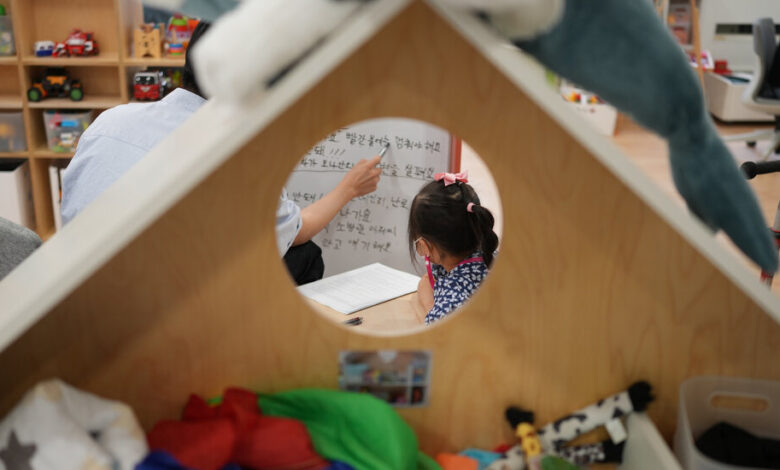In South Korea, a Hit Show Brings Autism Into the Spotlight

SEOUL — When Yoon Wn-ho, a visiting professor at Inha University in South Korea, saw “Extraordinary Attorney Woo” for the first time, he turned the television off. The popular Korean drama’s portrayal of a young autistic lawyer bothered Mr. Yoon, who has autism himself.
He thought the character seemed less like a full-fledged person than a collection of traits associated with autism. One example, he said, was her strict diet of kimbap, the seaweed-wrapped rice rolls served in slices, which she finds comforting because all the ingredients are visible.
“People who see the drama might think that all people with autism only eat kimbap like Woo Young-woo,” Professor Yoon said.
Some other South Koreans who know autism well have similar reservations about “Extraordinary Attorney Woo,” a feel-good show that spent several weeks this summer as Netflix’s most-watched non-English-language program. But they applaud it for promoting the discussion of autism in South Korea, where for many people, developmental disabilities are a taboo subject.
At one point, according to Nielsen Korea, an information and market analysis firm, nearly one-fifth of all television sets in the country were tuned to the show, which was carried on a Korean cable network as well as on Netflix. The show, and autism itself, have been topics of discussion online, and autism service centers have gotten attention from local news outlets.
“No one I know has autism, so I didn’t really know what it was,” said Min Huh, a 26-year-old Seoul resident. He said the program showed him “what people with autism could do.”
Officially, 34,000 people are known to have autism spectrum disorder in South Korea, a country of over 51 million, according to the most recent figures from the Ministry of Health and Welfare. But that is probably far below the true number because of the stigma that persists around autism and other disabilities, which discourages people from obtaining or reporting an autism diagnosis, said Son Da-eun, the director of Autism Partnership Korea. (In the United States, about 1 in 44 children aged 8 were identified as having autism spectrum disorder in 2018, according to an estimate from the Centers for Disease Control and Prevention.)
“South Koreans typically associate autism and disabilities with shame,” said Ms. Son, whose center provides care and treatment for young children with autism. Several parents whose children attend the center conceal the diagnosis from friends and relatives, and some blame themselves for it, she added.
Still, there is more open discussion of the condition, and more treatment options, than in the past. The number of officially acknowledged cases is about 20 times higher than it was two decades ago, according to government data. And new treatment centers are being built in Seoul.
Shin Yee-jin, a professor at the College of Medicine at Yonsei University in Seoul who works with developmentally disabled children, said that South Koreans with disabilities of all kinds face considerable discrimination because of a “low cultural tolerance for differences.”
Discrimination against people with disabilities, including autism, is illegal in South Korea, but it persists.
The National Human Rights Commission says that disabled people have been denied employment opportunities, refused insurance coverage and prevented from taking exams with fellow students, and that more than half of those interviewed for jobs are asked whether their disability will hinder their performance. On average, South Koreans with autism earn just over $800 a month, roughly a third of the national average, according to government figures.
Professor Yoon — who uses an unconventional romanization of his given name, Wn-ho — is believed to be the first South Korean diagnosed with autism to have gotten a Ph.D. He was diagnosed as a toddler. “It’s safe to assume that children with autism all get bullied in school,” said Professor Yoon, who is 35. “I was no exception.”
His parents chose to place him in a mainstream school, not a school specifically for autistic children. He says that was difficult, but he also believes it contributed to his academic and professional success.
“Attending a specialized school limits the opportunities to go to college and get a job,” he said, adding that he had to study the same curriculum and put in the same long hours as the other students. At one point, the bullying got so bad that he switched schools.
Even if Professor Yoon’s parents had wanted him to attend a specialized school, their options might have been limited. According to the nation’s Ministry of Education, there are fewer than 200 of those specialty schools in South Korea, and there were considerably fewer when he was a student.
Professor Yoon, whose academic specialty involves cultural and media studies, says his way of speaking and interacting with people has affected his performance evaluations because it does not conform to what people expect from a professor.
Professor Shin, several of whose patients are working adults, noted that the autism spectrum involves a wide range of symptoms and that many people with autism and other developmental disabilities are fully capable of working, especially if they receive treatment and support.
Ms. Son, of Autism Partnership Korea, says she has seen autistic children at the center develop their social skills substantially. One child who initially did not speak began doing so after two years of care, she said.
Ms. Son and Professor Shin both believe that “Extraordinary Attorney Woo” has helped to increase public awareness of autism. The show follows Woo Young-woo as she navigates complex cases at her law firm, explores an office romance and fights back against those who discriminate against her.
“I didn’t expect the drama to receive this much love,” said Yoo In-sik, the show’s director, who said he had been concerned about how a series with a developmentally disabled heroine would be received in South Korea. (There is precedent for it; “Good Doctor,” a short-lived 2013 Korean show about an autistic doctor, became the basis for an American series whose sixth season begins next month.)
Woo Young-woo, like the “Good Doctor” protagonist and some other autistic characters from films or TV, has savant syndrome, which in her case gives her the ability to memorize and analyze vast amounts of information. Ms. Son is a fan of “Extraordinary Attorney Woo,” but she worries that its viewers might conclude that all people with autism have that trait. She also thinks they might assume that an autistic child can easily develop the interaction and communication skills that Woo Young-woo has.
Mr. Yoo said the character was not meant to represent everyone on the autism spectrum. He said he hoped the series would encourage discussion of diversity and creating a more equal society.
Professor Yoon, though still no fan of the show, thinks it has done that. “Without the drama, people might not have ever paid attention,” he said.
But he also wants them to see that people with autism are not that different from everyone else. “I want people to stop thinking of us as incompetent and unable to communicate,” he said. “We can do it all, too.”




